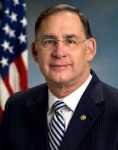- Supporting Americans with Disabilities and Their Families (3/6/25)
- Standing Up for Sportsmenís Access and Safety (2/20/25)
- Bringing Farm Country Voices to Washington (2/12/25)
- A New Front in the Fight Against Prostate Cancer (2/6/25)
- Taking Action to Reverse Immigration Failures and Protect Communities (1/30/25)
- Setting the Agenda for 2025 (1/22/25)
- Making progress for Arkansasís water infrastructure (1/16/25)
Strengthening the Health Care Workforce
Arkansans rely on access to physicians and health care professionals to provide life-saving and preventative care close to home. Rural states like ours face an acute need for medical providers. More than 500,000 Natural State residents live in an area defined by the federal government as lacking the adequate number of health professionals to serve the population. While we’re investing in educating and training the next generation of health care providers to help expand the delivery of health care across the state, Congress is also advancing a number of solutions to help enhance health care in rural communities and underserved areas.
Arkansas is not alone in experiencing an increasingly insufficient number of physicians. Nationwide, we’re facing a projected shortage of up to 124,000 doctors by 2034 according to the Association of American Medical Colleges. There is a bipartisan effort in both chambers of Congress to address this and I’m proud to support these initiatives to strengthen our health care workforce.
We’ve made positive steps in recent years with a small increase of Medicare-supported Graduate Medical Education (GME) positions and we’re building on this momentum.
I recently joined my colleagues to introduce legislation aimed at attracting medical professionals to practice in communities across Arkansas by increasing access to medical residency slots in areas with a shortage of health care professionals. The Physicians for Underserved Areas Act would update the GME distribution process to allow medical residency programs in areas with physician shortages a greater chance of gaining available residency slots following a hospital closure elsewhere in the country.
During residency, physicians refine their skills in specialty fields and obtain their license to practice. Once this step is completed, data show most doctors don’t move away. That’s why having GME positions in Arkansas is so vital to creating a pipeline of future medical providers.
We’re also working to incentivize students to join the medical field and encourage them to pursue residencies in rural areas by advancing the Resident Education Deferred Loan Interest Act. This legislation would allow medical and dental students to pause student loan interest accrual and principal loan repayment while serving in their residencies or internships.
UAMS chancellor Dr. Cam Patterson said these measures “will help retain physicians in areas where they are needed most.”
We are also aiming to preserve the talent developed at American medical schools to stay here to serve our citizens. The Conrad State 30 and Physician Access Reauthorization Act allows international doctors trained and educated in the United States to remain here as long as they practice in areas experiencing physician shortages.
Just as importantly as drawing physicians to rural areas is ensuring they want to stay. The Save Rural Hospitals Act would help curb the trend of hospital closures in rural communities by making sure they are fairly reimbursed for their services by the federal government. This would help hospitals increase compensation for doctors and other medical professionals.
Because this is an issue that impacts the entire country, there is widespread interest in developing policies to better support the health care needs of underserved areas. This will continue to be a priority for me and our state leaders to help Arkansans live longer, healthier lives.
Posting a comment requires free registration:
- If you already have an account, follow this link to login
- Otherwise, follow this link to register

